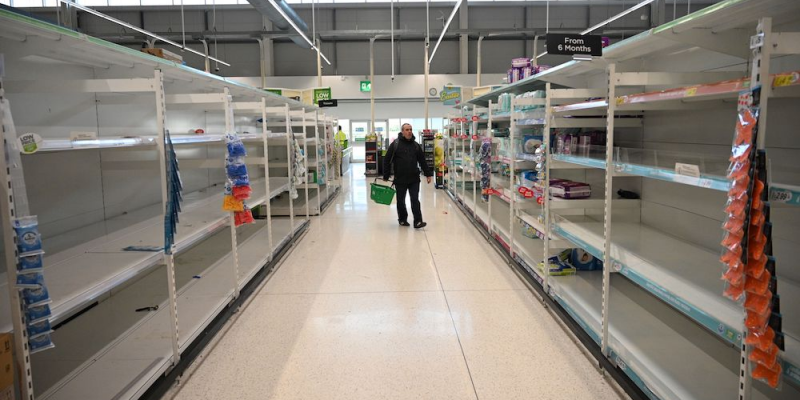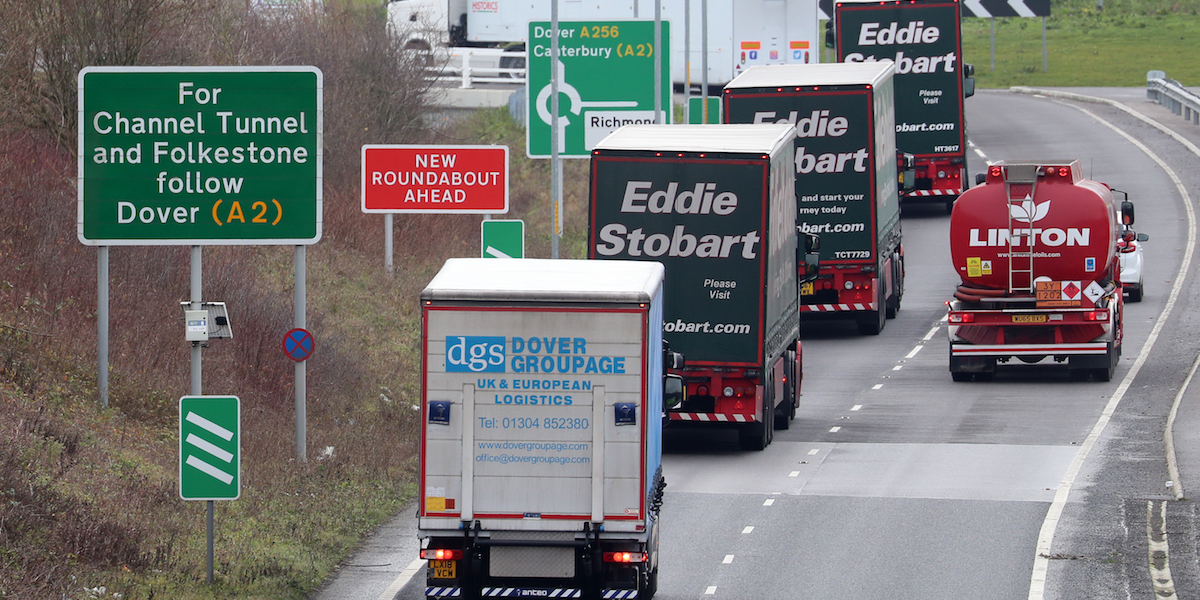- The UK logistics sector pleads with Boris Johnson to extend the Brexit transition period.
- The prime minister has insisted that he will not delay the next stage of Brexit, despite the COVID-19 virus crisis.
- The Freight Transport Association on Wednesday said: “Our industry needs the support of government, not to be broken by it.”
- The sector said companies cannot plan for new trading arrangements with the EU while dealing with the “emergency situation” created by the outbreak of the coronavirus.
- British hauliers are under huge pressure to deliver essentials after public demand rocketed.
- Visit Business Insider’s homepage for more stories.
The UK logistics sector has demanded that Prime Minister Boris Johnson extends the Brexit transition period, due to end in December, warning that the “once in a lifetime” coronavirus pandemic must be dealt with first.
The Freight Transport Association, which represents UK logistics, on Wednesday called for the Brexit transition period to be extended so they can “concentrate on the serious issues which the COVID-19 pandemic is placing on the industry.”
The transition period is due to expire at the end of December. Until then, the UK will follow all EU trade and customs rules, in order to give businesses on both sides of the border time to adapt new trading arrangements.
However, the outbreak of the COVID-19 virus across the continent has derailed negotiations over a new UK-EU free trade agreement, with talks postponed and the EU’s chief negotiator, Michel Barnier, testing positive for the virus.
Johnson has insisted he will not extend the transition period, despite the outbreak.
However, Elizabeth de Jong, the FTA's policy director, on Tuesday urged the prime minister to change his stance, warning: "Our industry needs the support of government, not to be broken by it."
De Jong said: "Logistics is facing unprecedented challenges, both in terms of keeping the UK economy supplied with all the goods it needs to function, as well as coping with the increased disruption to staffing levels caused by sickness and self-isolation and concerns about the viability of their businesses."
Hauliers have come under increased strain in recent weeks as demand for food and essentials in supermarkets has rocketed. Brits have been forced to eat at home after the UK government closed restaurants, cafes, and other non-essential businesses. A senior figure in the food & drink industry told Business Insider that one major retailer saw demand for one line of goods increase by 1,000% last week.

"Our first priority is always to deliver for our customers, and there is simply not enough capacity available to plan the major structural changes needed to implement a successful departure from the EU, as well as the myriad of other planned legislation changes on the horizon, as well as dealing with unprecedented pressures caused by COVID-19," de Jong said.
"In addition to the administrative, practical and financial difficulties experienced by our sector, the pandemic will undoubtedly have a significant impact on supplies of new equipment, technology and vehicles in the coming months, as well as the industry's ability to recruit and train new staff."
"Add in the challenge of adapting to new trading arrangements with the EU - which are yet to be formalised - and the situation is placing logistics under huge and unnecessary pressures."
She added: "Logistics is a flexible industry, but such significant change cannot happen overnight, and there is simply not the capacity for planning and delivery of new legislation at present within the system.
"COVID-19 has created a once-in-a-lifetime emergency situation which needs the full attention of the whole sector - adding in a host of new legislation would place untold, unnecessary pressure on a supply chain that is already stretched."
At a meeting of around 20 logistics companies last week, there was unanimous agreement that the industry should urge the UK government to extend the Brexit transition period.
The FTA says that companies are focusing completely on maintaining the movement of goods, and do not have the bandwith to also prepare for leaving the EU's single market and customs union.
Naomi Smith, CEO of Best For Britain, the cross-party campaign for close ties with EU, said: "UK hauliers are right to demand support from the government to extend transition. The logistics industry should be able to focus solely on ensuring the economy is supplied with all the goods it needs to weather the COVID-19 outbreak. We cannot fight a war on two fronts.
"We support calls on the UK Government to think again and give the country and vital services enough time to deal with one crisis at a time. Only then can we secure a relationship with Europe that protects our people, our jobs and our futures."
